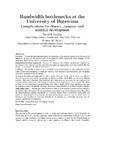Please use this identifier to cite or link to this item:
http://hdl.handle.net/10311/796| Title: | Bandwidth bottlenecks at the University of Botswana: complications for library, campus, and national development |
| Authors: | Gerhan, D.R. Mutula, S.M. |
| Keywords: | Internet Botswana Developing countries |
| Issue Date: | 2005 |
| Publisher: | Emerald |
| Citation: | Gerhan, D.R. & Mutula, S.M. (2005) Bandwidth bottlenecks at the University of Botswana: complications for library, campus, and national development, Library Hi Tech, Vol. 23, No. 1, pp. 102–117 |
| Abstract: | Purpose – To examine the technical reasons for excessively slow internet speeds at the University of Botswana, to discover the present state of development efforts addressing such examples of the qualitative digital divide, and to recommend remedies. Design/methodology/ approach – Surveys of students, the authors' professional experiences, and reports from corporate, public, and intergovernmental organizations provided insights into the effects – and causes – of internet slowdown. Findings –Bandwidth bottlenecks were identified in successive stages of intercontinental internet traffic. Causes included network design and capacity, telecommunications regulations, and competing budgetary demands within Botswana. Research limitations/implications – Much of the literature on the digital divide has stressed plentiful hardware and internet connections in affluent societies versus their scarcity in developing societies. This study illustrates that hardware and connections are necessary but not sufficient for adequate online performance. Technological advance and development can each stimulate the other, and that two-way interconnection necessitates more than a simple call for more spending to increase developing countries' bandwidth. The paper presents recommendations in addition to higher funding. Originality/value – Student and other micro-level data serve as measures for the local performance of a global utility, the internet. Tracking message transmission uncovers bottlenecks along the path of the intercontinental internet, specifically as it reaches Africa. These “street-level” approaches can assist the international aid community, the telecommunications industry, and the public sector in Botswana and elsewhere in removing obstacles to the internet as a potentially important tool for national- and human-development. |
| URI: | http://hdl.handle.net/10311/796 |
| ISSN: | 0737-8831 |
| Appears in Collections: | Research articles (Dept of Library and Information Studies) |
Files in This Item:
| File | Description | Size | Format | |
|---|---|---|---|---|
| Gerhan_LHT_2005.pdf | 1.53 MB | Adobe PDF |  View/Open |
Items in DSpace are protected by copyright, with all rights reserved, unless otherwise indicated.
